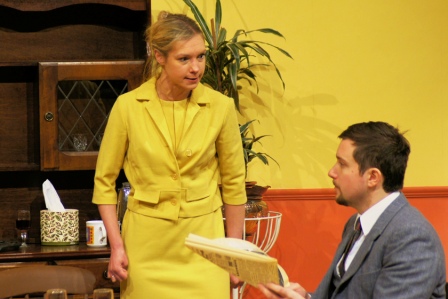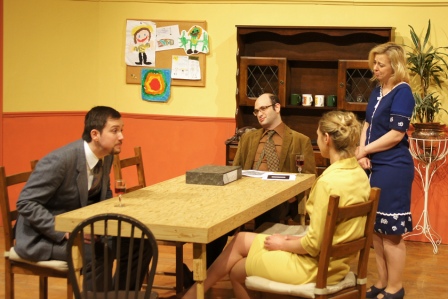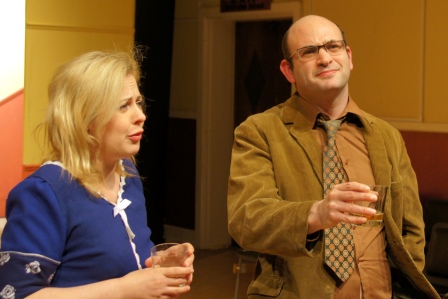|
|
|||||||||||||||||||||||||||||||||||||||||||||||||||||||||||||||||||||||||||
Click here for more pictures of this play |
|||||||||||||||||||||||||||||||||||||||||||||||||||||||||||||||||||||||||||
|
|||||||||||||||||||||||||||||||||||||||||||||||||||||||||||||||||||||||||||
|
Click here for the
NODA crit for this play |
|||||||||||||||||||||||||||||||||||||||||||||||||||||||||||||||||||||||||||
|
Benefactors is a play about the relationship of two couples against the backdrop of a changing London over a number of years starting in the 1960s. On one level it charts the attitudes to urban renewal and the aspirations of contemporary architects and planners, the Ďbenefactorsí of society. On another level, it describes the differences between two couples and teases the audience with the question of who are the real Ďbenefactorsí amongst them. Four very different characters are the protagonists. David and Jane, the architect who wishes to clear a slum in London and transform it and his anthropologist wife and Colin and Sheila, their unlikely friends. Colin is a sarcastic, complex and irritating frustrated writer and Sheila is his wife of a shotgun wedding - the frumpy unsure runt of the litter. The play is very wordy and uses a strong structure. The traditional drawing room and sofa are exchanged for the kitchen/diner as most of the action takes place around the David and Janeís table. Michael Frayn uses the characters to fill in the contemporary background to the play by having them speak, in turn, directly to the audience. LADS chose to stage this play on a thrust stage, with the audience on three sides. This gave the performance an instant intimacy with the audience, although playing it completely in the round may have given the audience and the actors an even more heightened focus. The fourth wall was the kitchen Ė a very long bright bare wall with a dresser with the necessary props and a notice board displaying a childís painting. The main entrances were symmetrical corridors leading off this, stage left and right, but without doors. The actors at times used the main hall doors, which was slightly distracting. Most of the action took place around a rather odd table. Whilst the lighting was a little too bright and unsubtle for most of these scenes, the use of four sharp-edged pools of light for the narrations worked very well. All the performances were strong and reliable. David is an ambitious architect played by Tom Donoghue. The character was clearly drawn and consistent throughout the play and quite thick-skinned when coping with his friend Colinís barbed rhetoric. He was played as a thrusting, self-centred young architect rather than as a thoughtful, generous academic. Davidís relationship with his wife, Jane, played by Sophie Robertson seemed a bit detached, with little affection or contact between them. Nevertheless her performance was clear and enjoyable. Sheila, played by Roz Gerrie, was probably the most difficult part to pull off and Roz played it strongly and with conviction. I thought she was not quite as drab or unsure as the character might have been. Colin, played by Jon Gilbert, was a complex and diverse character and he and Sheila provided the most powerful moment of the play when they argued. Jon provided us with a very watchable and interesting performance. Being a piece of writing that is putting across both a slice of personal and social history it requires very strong characterisation - Frayn demands a lot of his actors. I felt that the performances were solid and the play clearly blocked and rehearsed but the actors could all have benefited from the opportunity to develop their characters a little more. This was nevertheless an enjoyable and stimulating evening. Tom Johnson
This play is a four-hander which takes a cynical look at life during Margaret Thatcherís years as Prime Minister. Billed as a comedy, Michael Fraynís play is also a political drama making some harsh observations along the way as it explores a myriad of issues such as compromise, idealism and attitudes to change. Written in 1984, Benefactors is set against the backdrop of 1960s new housing projects. It focusses on two married couples, David Kitzinger, an idealistic architect and his supportive wife Jane who have a happy relationship and the bitter and cynical journalist Colin Molyneux and his subservient wife Sheila who in contrast are struggling. The play looks at the relationships between the four adults and Davidís attempt to build new homes to replace the slum housing of Basuto Road. However, David is gradually forced by circumstances into building skyscrapers. David becomes closer to Sheila, who becomes his secretary, but it is unclear if she is helping him or the other way around. Michael Fraynís characters are well drawn and dialogue sharp. Under the inspired direction of Andrew Rogers this production, by Loughton Amateur Dramatic Society, is set in the round allowing for the characters to have a strong and direct engagement with the audience. It worked well. The cast all gave outstanding performances. In particular Roz Gerrie carried off the part of Sheila perfectly, moving from downtrodden and silent wife to one who takes control of her life. The moments when she is browbeaten by her husband were quite moving. Jon Gilbert as her controlling husband gave a measured performance throughout as the devious and sardonic Colin. A destructive force he humiliates his wife and determines to destroy Davidís dream, revelling in his downfall. Sophie Robertsonís Jane was utterly convincing as the super-efficient, supportive, domestic goddess wife in Act one. She conveyed the shift in position well especially during the emotional argument in the second act as we see her role change. Tom Donoghue as the genial and well-intentioned David did the part full justice. Director Andrew Rogers ensures that the pace is maintained with effective narration and making sure the characters were constantly on the move. Staging this play in the round worked extremely well and drew the audience into the action. The actors were always visible and the audience connection deep as a result. The simple set was functional and worked well, with three entrances and the dining table as the focal point in the centre with the audience to three sides. The sound and lighting team did a great job. The fixed follow spot was very effective at the end as characters moved around and into the light to deliver lines. Congratulations to the cast who were superb. This was a very funny, yet thought provoking play and I loved the staging of this. Well done all. Cheryl Barrett (Sardines review) |
|||||||||||||||||||||||||||||||||||||||||||||||||||||||||||||||||||||||||||



